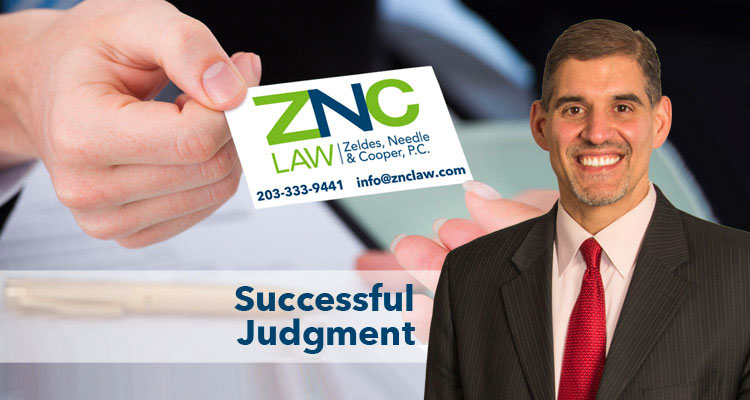Estate Tax Changes in the Tax Cuts and Jobs Act
The massive Tax Cuts and Jobs Act, effective beginning in 2018, made major changes to the estate and gift tax exemption that will result in many fewer estates being subject to the federal Estate and Gift tax. Before the Tax Cuts and Jobs Act, the first $5 million (as adjusted for inflation in years after... Read More
Local Counsel: ZNC’s Connecticut Commercial Attorneys Help Out-of-State Law Firms Succeed in Connecticut Courts
We are frequently asked by lawyers from outside Connecticut to serve as their Connecticut local counsel for matters pending in the state or federal courts. These firms look to us a Connecticut commercial litigation firm because of our wealth of experience before those courts, our knowledge of local practices and procedures, and our familiarity with... Read More
Attorney Fiano Successful In Obtaining $210,000 Arbitration Award Against Morgan Stanley
Sabato (“Sam”) Fiano and Lori A. DaSilva-Fiano, members of ZNC’s Litigation practice group, successfully secured an approximate $210,000 award against the global financial investment firm, Morgan Stanley, in a securities arbitration which was tried in November before an arbitration panel appointed by the Financial Industry Regulatory Authority (“FINRA”). ZNC represented a widow who was 77-years... Read More
Connecticut Condominiums: Collecting Common Charges and The Nine-Month Super Priority Lien –
By: Robert A. Pacelli, Jr. The Connecticut condominium association lien, also called the “Nine-Month Priority Super Lien,” provided in C.G.S. Sec. 47-258 gives Connecticut common interest communities a powerful tool to collect unpaid charges owed by unit owners. The statute provides that in most foreclosures of a unit, the Association must be paid up to 9... Read More
Attorney Virgil Secures $15.6 Million Jury Verdict
Jeremy Virgil, the chair of ZNC’s Connecticut personal injury practice, secured a $15.6 million jury verdict at Derby Superior Court last week. Attorney Virgil, a Bridgeport personal injury lawyer, represented the estate and family members of Salomon Martinez, who lost his life over a dispute arising from a beer pong game on January 16, 2013.... Read More
When A Unit Owner Files for Bankruptcy in a Connecticut Common Interest Community
By: Robert Pacelli Under Connecticut condominium law, owners are required to pay a wide variety of charges, such as for maintenance, yard work, etc. What happens to monies owed the condominium association when a unit owner declares bankruptcy? Overdue common charges, special assessments, fines, fees and other charges do not “disappear” when an owner files... Read More
Connecticut Condominium Associations: How to Levy Fines and Enforce the Rules
By: Robert A. Pacelli, Jr. The Connecticut Common Interest Ownership Act, gives condominium associations the power to impose reasonable fines against unit owners who don’t follow the association’s rules.[1] The Association’s power to levy fines usually provides an effective means to force unit owners to follow the association’s rules and regulations. This power, however, should be... Read More
Owning A House Together Without Marriage in Connecticut: What Happens When It Goes Bad?
When Co-Owners of a House Don’t Want to Live Together Any Longer – Connecticut Real Estate Litigation People buy a house, with both people as co-owners, without getting married for many reasons: gay couples who got together before same-sex marriage was allowed; engaged couples that plan to get married shortly; or straight couples that decided... Read More
Connecticut Condominiums: Taming Those Terrible Tenants
As a Connecticut condominium association board, or a property manager, you likely have encountered problems caused by tenants, unless your community is a co-operative (which often have rules requiring owner occupancy). These problems can be particularly difficult for two reasons: The owner often is not aware of the problems; and The Association may not... Read More
Connecticut Condominiums and Service Contracts: What Associations and Property Managers Need to Know
Under the Connecticut Common Interest Ownership Act, the condominium association is responsible for managing condominiums in Connecticut. Included in this power and authority is entering into service contracts with other to provide services to the development. Many Connecticut condominiums will hire a property manager to assume this duty. But whoever enters into the contracts on... Read More







